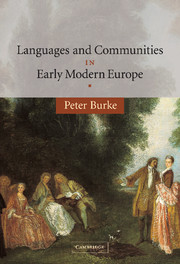Book contents
- Frontmatter
- Contents
- Acknowledgements
- Chronology 1450–1794
- Prologue: communities and domains
- 1 ‘Speak, that I may see thee’: the discovery of language in early modern Europe
- 2 Latin: a language in search of a community
- 3 Vernaculars in competition
- 4 Standardizing languages
- 5 Mixing languages
- 6 Purifying languages
- Epilogue: languages and nations
- Appendix: languages in Europe 1450–1789
- Bibliography
- Index
4 - Standardizing languages
Published online by Cambridge University Press: 07 December 2009
- Frontmatter
- Contents
- Acknowledgements
- Chronology 1450–1794
- Prologue: communities and domains
- 1 ‘Speak, that I may see thee’: the discovery of language in early modern Europe
- 2 Latin: a language in search of a community
- 3 Vernaculars in competition
- 4 Standardizing languages
- 5 Mixing languages
- 6 Purifying languages
- Epilogue: languages and nations
- Appendix: languages in Europe 1450–1789
- Bibliography
- Index
Summary
The more the domain of the vernaculars, at least some vernaculars, expanded, the more necessary it was for those vernaculars to be standardized. ‘Standardization’ is an ambiguous term that refers not only to the process of becoming more uniform (uniformidad, Nebrija called it) but also to following rules. The purpose of standardization in this period was also double. It was partly pragmatic, to facilitate communication between regions, and partly honorific, to give Italian, or Spanish, or German, or English some of the prestige or dignity associated with Latin. When Du Bellay, for example, wrote about the illustration of the French language, he was discussing how to make it illustrious, on the model of the volgare illustre recommended by Dante. His wish was to elevate French (élever nostre vulgaire); to the level of more famous languages. The Spanish humanist Cristóbal de Villalón explained that he wrote his grammar to make his nation great (engrandecer las cosas de mi nación).
A language without a standard was regarded as ‘in a manner barbarous’, as the poet John Dryden remarked in 1660. Civilization implied following a code of behaviour, including linguistic behaviour. The sociologist Norbert Elias's idea of a ‘civilizing process’ in early modern Europe might therefore be extended to include attempts to reform language. Using the approved or standard variety of language was, for many speakers at least, a form of self-control, since what came ‘naturally’ (or at least habitually) to them was another variety, such as dialect.
- Type
- Chapter
- Information
- Languages and Communities in Early Modern Europe , pp. 89 - 110Publisher: Cambridge University PressPrint publication year: 2004

